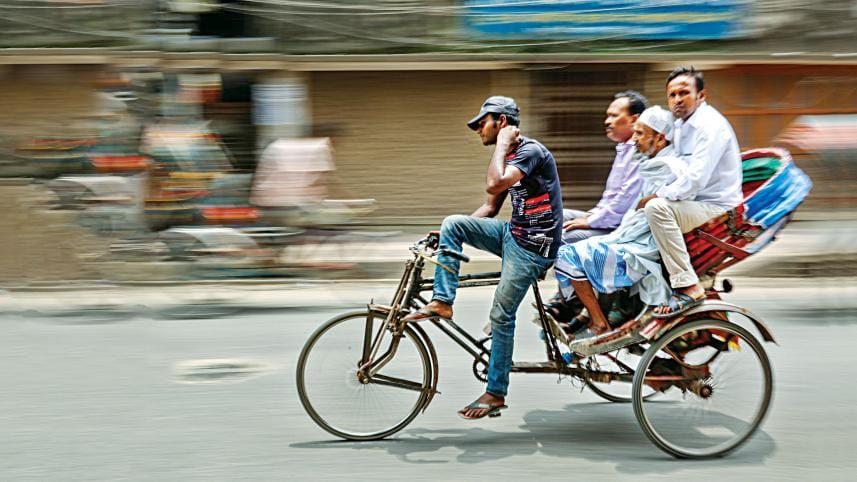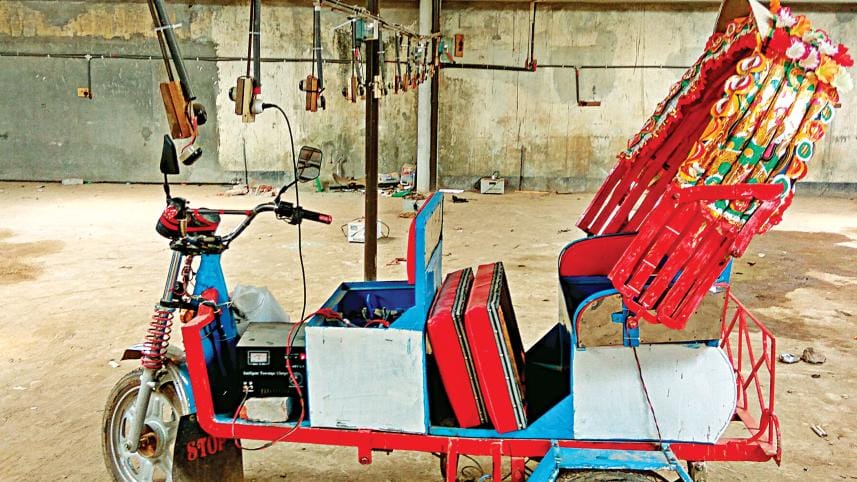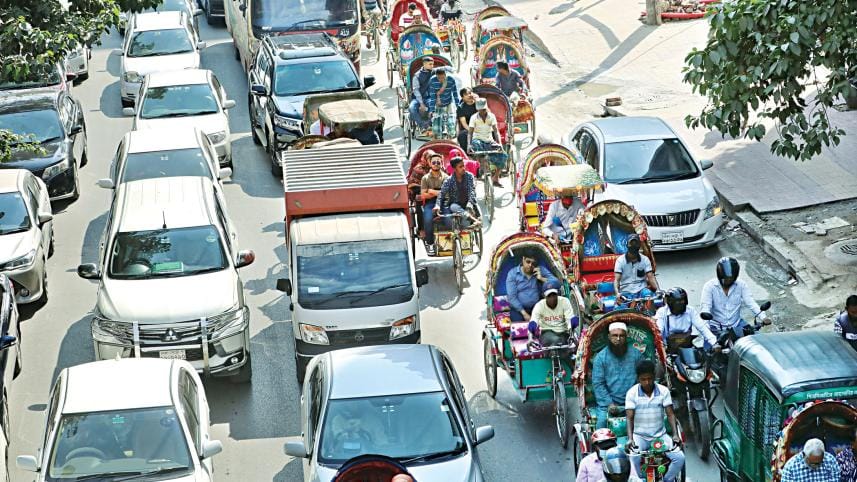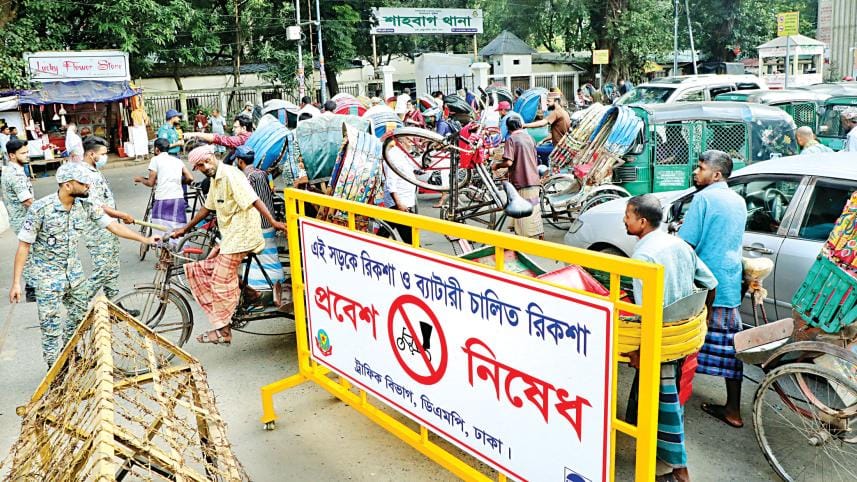Local mechanics rev up the road, now govt needs to catch up

Amid the worldwide development of electric vehicles, which is changing the traffic landscape away from fossil fuels, Bangladeshi mechanics brought their humble version of an e-vehicle to the road: a battery-run rickshaw -- awkwardly wired, with visible battery units slinging on the back.
The mechanics have done their job in shanty factories, backyard garages and home yard workshops, providing the solution for a nation to move faster and cheaper.
Now it is up to the authorities to make the rudimentary three-wheeler auto-rickshaws safer and more sustainable.
The process of formalisation of the improvised technology has an official name -- "regularisation".

But what if the regularisation is delayed? What if we simply continue to turn a blind eye to battery-run auto-rickshaws flooding the streets?
Then, these faster-than-manual rickshaws would continue to contribute to more than 15 percent of road accidents per month, according to estimates by the Jatri Kalyan Samity, a passenger welfare platform in the country.
On the other hand, taking motorised three-wheelers off the streets would threaten the income of at least 200,000 battery-rickshaw drivers, including Shardul Islam, in Dhaka alone.
And, it would leave the question begging for an answer: is our civilised morality comfortable with allowing sweat-soaked rickshaw pullers to toil to make their ends meet?
First, let's explore Islam's transition, including his daily income, from intense manual rickshaw pulling to battery-powered ones.

THE ECONOMICS OF TRANSITION
Thirty-five-year-old Islam runs his rickshaw in the capital's Shahbagh and adjacent areas. Eight years ago, when he was younger and more energetic, he could barely manage three meals a day for his family by pulling a manual rickshaw.
"Now I earn Tk 1,200-1,500 a day, from which I pay Tk 450 for the rickshaw rent, including Tk 60 for charging and sometimes Tk 100-150 for minor repairs," he calculates, sitting in his battery rickshaw.
"On good days, I take home Tk 800-900, but during monsoons or political unrest, earnings can decline."
The economics of this transition hints at a complex web of financial shifts and opportunities.
Traditional rickshaw owners usually rented their vehicles for Tk 100-150 daily, but the physical toll on rickshaw pullers often resulted in fewer working hours and inconsistent income.
The shift to e-rickshaws has introduced a new financial model: higher daily rental fees of Tk 450-500, and increased earnings at the same time for the drivers with reduced physical strain.
In Korail slum of Dhaka, both of Islam's daughters attend school, and he looks to improve their future with his earnings.
In contrast, Mustafiz Rahman in Nilkhet area of the capital toils with his old pedal rickshaw.
Rahman said that passengers now prefer battery rickshaws because they are faster than pedal ones. When hiring, many passengers look for battery-run rickshaws as they offer a slightly wider seating arrangement and can carry more than two passengers without burdening the puller.
"Although we exert more effort with pedal rickshaws, auto-rickshaws generate more income," Rahman gave his verdict. "I am also considering switching to an auto soon."
Rashid Ahmed, a rickshaw mechanic for 15 years, now focuses on battery rickshaws due to the changing demand.
"Pedal rickshaws are no longer profitable. People are always in a hurry and prefer the speed and convenience of auto-rickshaws," he said. "These vehicles require less effort, travel faster, the batteries are inexpensive and they can carry more passengers."
According to a study by the Coastal Livelihood and Environmental Action Network (CLEAN), battery-powered rickshaws across the country consume 659MW of electricity daily, which accounts for 2.5 percent of the country's total installed capacity.
These three-wheelers, the cheapest mode of transportation due to their low energy costs, serve around 2.5 crore people daily for short-distance commutes.
The study showed that the auto-rickshaws contribute nearly Tk 97,625 crore to the national economy annually, including Tk 7,500 crore from manufacturing, Tk 8,000 crore from the battery market and Tk 82,125 crore from commuting, servicing and charging services.
Hasan Mehedi, CEO of CLEAN, said these vehicles were invented by local people, not the authorities.
"The locals recognised the need for mobility, so they built these vehicles independently. Now, it is up to the authorities to decide how they will be regulated and operated," he added.
Referring to their study, Mehedi said that 80 percent of the internal combustion engine (ICE) vehicles in Bangladesh consume fuel inefficiently, with only a 20 percent efficiency rate.
In contrast, auto-rickshaws operate at 75-80 percent efficiency. Thus, a battery-run rickshaw costs Tk 1.50 per kilometre.

A PATH OUT OF RURAL POVERTY
Twenty-five-year-old Elias Amin's journey from Sirajganj to the streets of Old Dhaka was not simple and linear.
After leaving school in sixth grade due to poverty, Elias faced the harsh reality that confronts many rural youths, the choice between farming and urban migration.
"When my father passed away five years ago, I became responsible for my mother and sister overnight," Elias recalled, adjusting his facemask during a brief break between rides.
"In the village, even finding daily work was a struggle. Some days I earned Tk 200, other days nothing."
His decision to migrate to Dhaka was difficult, but he did not have many options.
As a rickshaw driver, Elias now earns Tk 40,000 monthly, a sum that would have seemed impossible in his village. This income has not only improved his life but created ripple effects back home.
"My sister is now in class five, and I can send Tk 15,000 monthly to my mother. Sometimes, I even manage to save Tk 5,000-7,000 for emergencies. I also do some savings for myself sometimes," he said with pride.
"I'm learning about e-rickshaw mechanics in my spare time. Maybe in two years, I can open my own shop," he shared.

LONE UNREGISTERED VEHICLE ON ROAD
Auto-rickshaws run at an average speed of 30 kilometres per hour. On roads, no vehicles operate without registration or licences at speeds approaching those of the rickshaws.
This means allowing these rickshaws into Dhaka's highly heterogeneous traffic could pose a source of risk. Neither these three-wheelers nor their drivers have any fitness or safety certifications.
"From a safety perspective, the biggest concern is that these vehicles are simply not suited for movement in Dhaka -- one of the slowest cities in the world," said Professor Md Shamsul Hoque, director of the Accident Research Institute of Bangladesh University of Engineering and Technology.
Referring to the structure of auto-rickshaws, especially the improvised vehicles instead of somewhat custom-made battery-powered rickshaws, he stated that they are not suitable for high speeds.
"The primary safety issue is that, since these vehicles are not regulated by the BRTA, the drivers are untrained and lack proper road sense," he said.
"Without a regulated number of vehicles, the situation becomes chaotic, with vehicles competing with each other," Hoque added.
He also said that based on scientific planning, there must be sustainable use of transportation by considering these vehicles as feeders for buses.
"Since buses do not enter residential areas for short trips, these vehicles are necessary in such cases. However, we must regulate their numbers if needed."
Hoque recommended evaluating the capacity of urban roads and determining how much traffic they can accommodate before considering the introduction of any additional forms of transportation.
Terming auto-rickshaws as technological progress, Dr Khondaker Golam Moazzem, research director of the Centre for Policy Dialogue, said: "We should recognise and appreciate it."
"E-rickshaws have a positive impact on employment. It reduces travel time and saves resources," he added.
Addressing the involvement of people living under the poverty line in this sector, Moazzem mentioned that this initiative has created additional employment opportunities, providing work for low-income individuals. These opportunities will help increase their family income and improve their living standard.
"However, it is essential to establish guidelines addressing the identified weaknesses, set clear specifications and develop a separate policy for the system," he added.
A top official of the Bangladesh Road Transport Authority said that a rickshaw is not a mechanical vehicle by default, it becomes one once a motor is installed.
"If the safety features designed for mechanical vehicles do not function properly in these vehicles, they can become dangerous. Accidents are also a concern."
Naturally, the next steps regarding this issue will need to be determined through discussions with all stakeholders, the official added.




 For all latest news, follow The Daily Star's Google News channel.
For all latest news, follow The Daily Star's Google News channel.
Comments